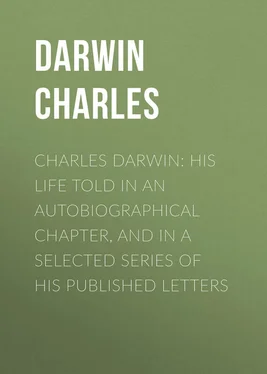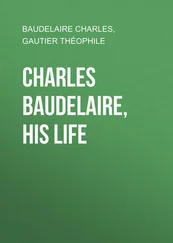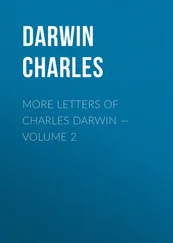Charles Darwin - Charles Darwin - His Life Told in an Autobiographical Chapter, and in a Selected Series of His Published Letters
Здесь есть возможность читать онлайн «Charles Darwin - Charles Darwin - His Life Told in an Autobiographical Chapter, and in a Selected Series of His Published Letters» — ознакомительный отрывок электронной книги совершенно бесплатно, а после прочтения отрывка купить полную версию. В некоторых случаях можно слушать аудио, скачать через торрент в формате fb2 и присутствует краткое содержание. Жанр: foreign_antique, foreign_prose, на английском языке. Описание произведения, (предисловие) а так же отзывы посетителей доступны на портале библиотеки ЛибКат.
- Название:Charles Darwin: His Life Told in an Autobiographical Chapter, and in a Selected Series of His Published Letters
- Автор:
- Жанр:
- Год:неизвестен
- ISBN:нет данных
- Рейтинг книги:5 / 5. Голосов: 1
-
Избранное:Добавить в избранное
- Отзывы:
-
Ваша оценка:
- 100
- 1
- 2
- 3
- 4
- 5
Charles Darwin: His Life Told in an Autobiographical Chapter, and in a Selected Series of His Published Letters: краткое содержание, описание и аннотация
Предлагаем к чтению аннотацию, описание, краткое содержание или предисловие (зависит от того, что написал сам автор книги «Charles Darwin: His Life Told in an Autobiographical Chapter, and in a Selected Series of His Published Letters»). Если вы не нашли необходимую информацию о книге — напишите в комментариях, мы постараемся отыскать её.
Charles Darwin: His Life Told in an Autobiographical Chapter, and in a Selected Series of His Published Letters — читать онлайн ознакомительный отрывок
Ниже представлен текст книги, разбитый по страницам. Система сохранения места последней прочитанной страницы, позволяет с удобством читать онлайн бесплатно книгу «Charles Darwin: His Life Told in an Autobiographical Chapter, and in a Selected Series of His Published Letters», без необходимости каждый раз заново искать на чём Вы остановились. Поставьте закладку, и сможете в любой момент перейти на страницу, на которой закончили чтение.
Интервал:
Закладка:
On the subject of design, he wrote (July 1860) to Dr. Gray:
"One word more on 'designed laws' and 'undesigned results.' I see a bird which I want for food, take my gun and kill it, I do this designedly . An innocent and good man stands under a tree and is killed by a flash of lightning. Do you believe (and I really should like to hear) that God designedly killed this man? Many or most persons do believe this; I can't and don't. If you believe so, do you believe that when a swallow snaps up a gnat that God designed that that particular swallow should snap up that particular gnat at that particular instant? I believe that the man and the gnat are in the same predicament. If the death of neither man nor gnat is designed, I see no good reason to believe that their first birth or production should be necessarily designed."
Dear Sir, – I hope that you will not think it intrusive on my part to thank you heartily for the pleasure which I have derived from reading your admirably-written Creed of Science , though I have not yet quite finished it, as now that I am old I read very slowly. It is a very long time since any other book has interested me so much. The work must have cost you several years and much hard labour with full leisure for work. You would not probably expect any one fully to agree with you on so many abstruse subjects; and there are some points in your book which I cannot digest. The chief one is that the existence of so-called natural laws implies purpose. I cannot see this. Not to mention that many expect that the several great laws will some day be found to follow inevitably from some one single law, yet taking the laws as we now know them, and look at the moon, where the law of gravitation – and no doubt of the conservation of energy – of the atomic theory, &c., &c., hold good, and I cannot see that there is then necessarily any purpose. Would there be purpose if the lowest organisms alone, destitute of consciousness, existed in the moon? But I have had no practice in abstract reasoning, and I may be all astray. Nevertheless you have expressed my inward conviction, though far more vividly and clearly than I could have done, that the Universe is not the result of chance. 50 50 The Duke of Argyll ( Good Words , April 1885, p. 244) has recorded a few words on this subject, spoken by my father in the last year of his life. " … in the course of that conversation I said to Mr. Darwin, with reference to some of his own remarkable works on the Fertilisation of Orchids , and upon The Earthworms , and various other observations he made of the wonderful contrivances for certain purposes in nature – I said it was impossible to look at these without seeing that they were the effect and the expression of mind. I shall never forget Mr. Darwin's answer. He looked at me very hard and said, 'Well, that often comes over me with overwhelming force; but at other times,' and he shook his head vaguely, adding, 'it seems to go away.'"
But then with me the horrid doubt always arises whether the convictions of man's mind, which has been developed from the mind of the lower animals, are of any value or at all trustworthy. Would any one trust in the convictions of a monkey's mind, if there are any convictions in such a mind? Secondly, I think that I could make somewhat of a case against the enormous importance which you attribute to our greatest men; I have been accustomed to think second, third, and fourth-rate men of very high importance, at least in the case of Science. Lastly, I could show fight on natural selection having done and doing more for the progress of civilisation than you seem inclined to admit. Remember what risk the nations of Europe ran, not so many centuries ago, of being overwhelmed by the Turks, and how ridiculous such an idea now is! The more civilised so-called Caucasian races have beaten the Turkish hollow in the struggle for existence. Looking to the world at no very distant date, what an endless number of the lower races will have been eliminated by the higher civilised races throughout the world. But I will write no more, and not even mention the many points in your work which have much interested me. I have indeed cause to apologise for troubling you with my impressions, and my sole excuse is the excitement in my mind which your book has aroused.
I beg leave to remain, dear sir,
Yours faithfully and obliged.
Darwin spoke little on these subjects, and I can contribute nothing from my own recollection of his conversation which can add to the impression here given of his attitude towards Religion. 51 51 Dr. Aveling has published an account of a conversation with my father. I think that the readers of this pamphlet ( The Religious Views of Charles Darwin , Free Thought Publishing Company, 1883) may be misled into seeing more resemblance than really existed between the positions of my father and Dr. Aveling: and I say this in spite of my conviction that Dr. Aveling gives quite fairly his impressions of my father's views. Dr. Aveling tried to show that the terms "Agnostic" and "Atheist" are practically equivalent – that an atheist is one who, without denying the existence of God, is without God, inasmuch as he is unconvinced of the existence of a Deity. My father's replies implied his preference for the unaggressive attitude of an Agnostic. Dr. Aveling seems (p. 5) to regard the absence of aggressiveness in my father's views as distinguishing them in an unessential manner from his own. But, in my judgment, it is precisely differences of this kind which distinguish him so completely from the class of thinkers to which Dr. Aveling belongs.
Some further idea of his views may, however, be gathered from occasional remarks in his letters.
CHAPTER IV.
REMINISCENCES OF MY FATHER'S EVERYDAY LIFE
It is my wish in the present chapter to give some idea of my father's everyday life. It has seemed to me that I might carry out this object in the form of a rough sketch of a day's life at Down, interspersed with such recollections as are called up by the record. Many of these recollections, which have a meaning for those who knew my father, will seem colourless or trifling to strangers. Nevertheless, I give them in the hope that they may help to preserve that impression of his personality which remains on the minds of those who knew and loved him – an impression at once so vivid and so untranslatable into words.
Of his personal appearance (in these days of multiplied photographs) it is hardly necessary to say much. He was about six feet in height, but scarcely looked so tall, as he stooped a good deal; in later days he yielded to the stoop; but I can remember seeing him long ago swinging back his arms to open out his chest, and holding himself upright with a jerk. He gave one the idea that he had been active rather than strong; his shoulders were not broad for his height, though certainly not narrow. As a young man he must have had much endurance, for on one of the shore excursions from the Beagle , when all were suffering from want of water, he was one of the two who were better able than the rest to struggle on in search of it. As a boy he was active, and could jump a bar placed at the height of the "Adam's apple" in his neck.
He walked with a swinging action, using a stick heavily shod with iron, which he struck loudly against the ground, producing as he went round the "Sand-walk" at Down, a rhythmical click which is with all of us a very distinct remembrance. As he returned from the midday walk, often carrying the waterproof or cloak which had proved too hot, one could see that the swinging step was kept up by something of an effort. Indoors his step was often slow and laboured, and as he went upstairs in the afternoon he might be heard mounting the stairs with a heavy footfall, as if each step were an effort. When interested in his work he moved about quickly and easily enough, and often in the midst of dictating he went eagerly into the hall to get a pinch of snuff, leaving the study door open, and calling out the last words of his sentence as he left the room.
Читать дальшеИнтервал:
Закладка:
Похожие книги на «Charles Darwin: His Life Told in an Autobiographical Chapter, and in a Selected Series of His Published Letters»
Представляем Вашему вниманию похожие книги на «Charles Darwin: His Life Told in an Autobiographical Chapter, and in a Selected Series of His Published Letters» списком для выбора. Мы отобрали схожую по названию и смыслу литературу в надежде предоставить читателям больше вариантов отыскать новые, интересные, ещё непрочитанные произведения.
Обсуждение, отзывы о книге «Charles Darwin: His Life Told in an Autobiographical Chapter, and in a Selected Series of His Published Letters» и просто собственные мнения читателей. Оставьте ваши комментарии, напишите, что Вы думаете о произведении, его смысле или главных героях. Укажите что конкретно понравилось, а что нет, и почему Вы так считаете.












